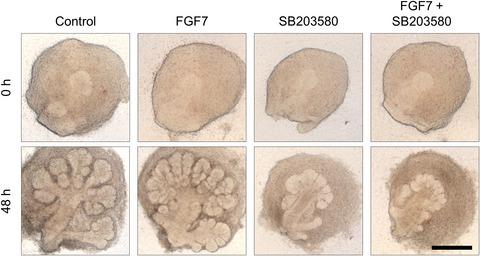当前位置:
X-MOL 学术
›
FEBS Lett.
›
论文详情
Our official English website, www.x-mol.net, welcomes your feedback! (Note: you will need to create a separate account there.)
ΔNp63 is upregulated during salivary gland regeneration following duct ligation and irradiation in mice
FEBS Letters ( IF 3.5 ) Pub Date : 2020-08-18 , DOI: 10.1002/1873-3468.13896 Kazuki Ikai 1 , Manabu Sakai 2 , Hitomi Ono Minagi 3 , Nao Gojo 1 , Takayoshi Sakai 1
FEBS Letters ( IF 3.5 ) Pub Date : 2020-08-18 , DOI: 10.1002/1873-3468.13896 Kazuki Ikai 1 , Manabu Sakai 2 , Hitomi Ono Minagi 3 , Nao Gojo 1 , Takayoshi Sakai 1
Affiliation

|
The transcription factor p63, a component of the p53 family, has important functions in development, homeostasis, and regeneration of epithelial tissues. However, the role of p63 in the regeneration of exocrine glands, including the salivary glands (SGs), has not been fully investigated. We investigated p63 expression in SG regeneration induced by duct ligation and irradiation. The expression of ΔNp63, a p63 isoform, increased and was colocalized with keratin 5 positive cells were myoepithelial cells. Furthermore, ΔNp63 expression was regulated by FGF7 stimulation via p38 MAPK phosphorylation and affected SG morphogenesis. These results suggest that ΔNp63 is essential for SG regeneration and may be a new target for regenerative treatment.
中文翻译:

ΔNp63 在小鼠导管结扎和照射后唾液腺再生过程中上调
转录因子 p63 是 p53 家族的一个组成部分,在上皮组织的发育、稳态和再生中具有重要功能。然而,p63 在外分泌腺(包括唾液腺 (SG))再生中的作用尚未得到充分研究。我们研究了导管结扎和照射诱导的 SG 再生中 p63 的表达。ΔNp63(一种 p63 同种型)的表达增加并与角蛋白 5 阳性细胞共定位,即肌上皮细胞。此外,ΔNp63 表达受 FGF7 刺激通过 p38 MAPK 磷酸化调节并影响 SG 形态发生。这些结果表明 ΔNp63 对 SG 再生至关重要,可能是再生治疗的新靶点。
更新日期:2020-08-18
中文翻译:

ΔNp63 在小鼠导管结扎和照射后唾液腺再生过程中上调
转录因子 p63 是 p53 家族的一个组成部分,在上皮组织的发育、稳态和再生中具有重要功能。然而,p63 在外分泌腺(包括唾液腺 (SG))再生中的作用尚未得到充分研究。我们研究了导管结扎和照射诱导的 SG 再生中 p63 的表达。ΔNp63(一种 p63 同种型)的表达增加并与角蛋白 5 阳性细胞共定位,即肌上皮细胞。此外,ΔNp63 表达受 FGF7 刺激通过 p38 MAPK 磷酸化调节并影响 SG 形态发生。这些结果表明 ΔNp63 对 SG 再生至关重要,可能是再生治疗的新靶点。


























 京公网安备 11010802027423号
京公网安备 11010802027423号